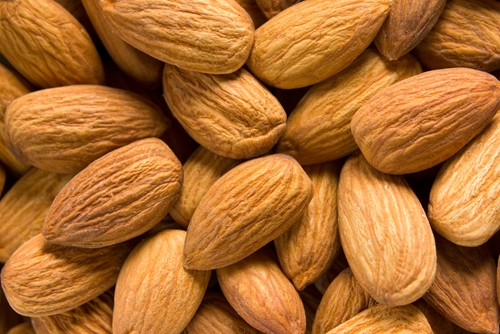Foods that Fight Dementia: Reduce your risk eating!

It is common knowledge that the food you eat affects your overall well-being. For seniors, eating the right kinds of foods can have a major impact on risk for dementia. Foods that fight dementia can be a huge additional step in your health plan and daily life. Adding a few foods, or increasing how frequently you consume them, can provide you with beneficial nutrients to keep your brain healthy.
Foods That Fight Dementia: A Strategy to Use The Food You Eat to Avoid Symptoms
Almonds
Vitamin E is important for healthy blood vessels. The antioxidant properties of Vitamin E also make it a crucial part of senior wellness. The Aging Research Center in Stockholm, Sweden found that those who had higher levels of Vitamin E in their blood had a lower risk of developing Alzheimer’s disease compared to those who had lower levels.
Most researchers recommend that seniors get their daily intake of Vitamin E from food rather than supplements. Research has shown that too much Vitamin E can have negative effects on the body. Almonds are a great source of Vitamin E, but most people get the majority of their intake from canola, sunflower and olive oil, avocados, other nuts, whole grains and wheat germs.
Beans
B vitamins are essential for healthy brain function. Beans and green peas are packed with B vitamins and folic acid that could lower the risk of dementia for people who already have some cognitive impairment. Other good sources for B vitamins are fish, poultry, meat and fortified cereals. For memory care and the prevention of dementia, seniors might want to consider taking a B12 vitamin.
A study by the University of Oxford found that patients with mild cognitive and memory problems who took B vitamin supplements were discovered to have less cognitive impairment after two years than those who took a placebo pill.
Of people over the age of 70, one in every six will have some kind of cognitive impairment. About half of those people will eventually develop dementia or Alzheimer’s disease. The study found that B vitamins – folic acid, B6 and B12 – help control levels of homocysteine. High levels are known to correlate with higher rates of Alzheimer’s disease.
“It is our hope that this simple and safe treatment will delay the development of Alzheimer’s disease in many people who suffer from mild memory problems,” said David Smith, a professor in the Department of Pharmacology at Oxford University.
Citrus
Several studies over the years have shown that Vitamin C can have many benefits for the brain, including protecting from the risk of developing Alzheimer’s. As a vitamin that is packed with antioxidants, Vitamin C acts a protector of brain cells by soaking up free radicals that could cause dementia. Adding more Vitamin C into your diet can also boost your mood and give you healthier skin.
Oranges, tangerines, limes and lemons all have high amounts of Vitamin C. Little-known sources for Vitamin C include grapefruit, strawberries, tomatoes and leafy greens. However, grapefruit juice can alter the effects of certain prescription drugs, and should be avoided if you take medications.

